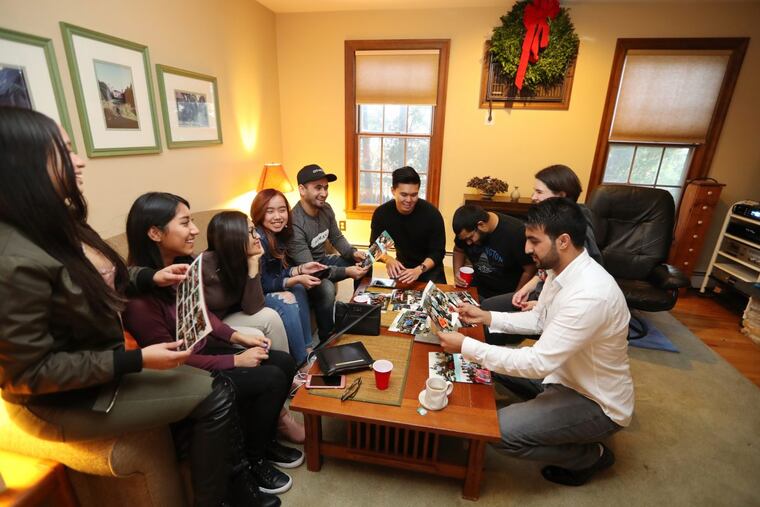An ESL Thanksgiving: At South Jersey bash, newcomers to U.S. talk turkey | Kevin Riordan
David Hodges, who teaches ESL at Community College of Philadelphia, invited students to experience the holiday meal.

Arshad Ali, who emigrated from Pakistan to Philadelphia in 2014, was the first to arrive at David Hodges' feast.
Setting down a pitcher of his secret-recipe turkey gravy, the host and chef in quick succession greeted Ali, Mardanny Reyes of the Dominican Republic, and Kenick Willie, from Indonesia.
"I wanted to invite my students to experience something as [quintessentially] American as Thanksgiving," said Hodges, a longtime English as a Second Language teacher at Community College of Philadelphia.
Given that President Trump is all about building walls and imposing travel bans, sharing roast turkey and all the trimmings, he added, "is a welcoming thing."
Welcoming indeed: The vintage house on Knight Park in Collingswood that Hodges shares with his wife, Donna Schorr, came alive with world music and festive conversation on Friday as Hodges threw a post-Thanksgiving bash for his past and present students from around the world.
Some guests came with classmates, but others knew only their beloved teacher. Hodges, 64, said his classroom is all about helping newcomers to America "take the training wheels [of their home language] off and speak English as much as possible."
Several guests told me their ability to converse with friends and understand classroom instruction had greatly improved thanks to Hodges. And during the party, more than two dozen young men and women from vastly different cultures and languages — but with English as their new common language — socialized, sampled dishes, and posed for group selfies in front of the fire.
"I had heard about Thanksgiving. A lot of my cousins are here and posted pictures about it on Facebook," said Ali, 24, who studied pharmacy in Pakistan and plans to continue those studies at Temple University.
"This is a new experience for me," said Reyes, 17, who came to the United States two years ago, lives in North Philadelphia, and is studying psychology at CPP.
As two dozen people from India, Vietnam, Ecuador, Belarus, Iraq, and other countries shared the signature American meal, Willie, 24, emerged as an energizer of the proceedings.
"Who wants dates? Don't panic, they're organic," he said, passing around a container of dried fruits.
"I just want to be happy and meet people, which is why I became a bartender," he added.
"I like a gathering like this, with nice people," said Tahir Bendif, 31, an Uber driver from South Philly by way of Algeria. "I have no family here."
Almost all of the dinner guests live in the city, many in the polyglot Northeast; they are in the United States legally, on student or work visas, going to school or working (or both), and hoping to become citizens.
"The students I see are the successes, the ones who got here. And it's harder and harder to get here, harder to feel comfortable here," said Hodges, an emigre from Ohio who also is the director of the Collingswood Farmers Market.
"In my classroom, we don't talk much about national politics or individual struggles. But some of us are friends on social media, and sometimes they share stories that can break your heart. And they have radically different opinions about how welcoming America is."
Some of the guests told me they want more border security or stricter regulations to keep what one called "dangerous" people out of the United States.
Others said some Americans are rude to foreigners. "Driving in Philly is tough," said Bendif, hastening to add that "I only focus on the positive, not the negative, things."
Or as Willie, who also prefers to accentuate the positive, said: "Has anyone said to me, 'You're Asian, go back to Asia'? No."
Sonu Varma, 27, a software engineer who moved from India to South Jersey in 2006 and now lives in Center City, said "some people are shortsighted and see anything new as threatening."
Lately he's been surprised to hear more people expressing "racist opinions" than was common in the past.
"What matters to me is how people treat me and how I treat them," he said. "No matter where they come from."
Nashwa Altaan, 42, earned a degree in physics in her native Iraq. She does clerical work and lives in Northeast Philly.
"Sometimes I get disappointed and tired," she said. "But I say to myself, 'I can do it. Keep going. Keep going.'"
I can't imagine doing what Assia Sakalouskaya did: Getting off a flight from Belarus two years ago at age 27, knowing no one, with little understanding of English, and only "two bags and 800 bucks" to her name. She can laugh about it now.
"I had nothing to lose. Now I live in Northeast Philly, which is like Russia. Everybody speaks Russian or Ukrainian. Sometimes I think I didn't leave," said Sakalouskaya, who earned a mathematics degree in Belarus and now works for a medical billing firm.
But she has enough money for an apartment, and for clothing and other necessities. She no longer lives in a police state were dissenters can get thrown in jail. "I've seen Niagara Falls and New York City," she said.
Preparing to leave, I asked Hodges how even the most lively and congenial of dinners can make a difference.
"It can," he said. "It does. It makes a great deal of difference in our small international world."
And I particularly appreciated Bendif's answer when I asked him a similar question.
"This gathering," he said. "is the real example of the American people."